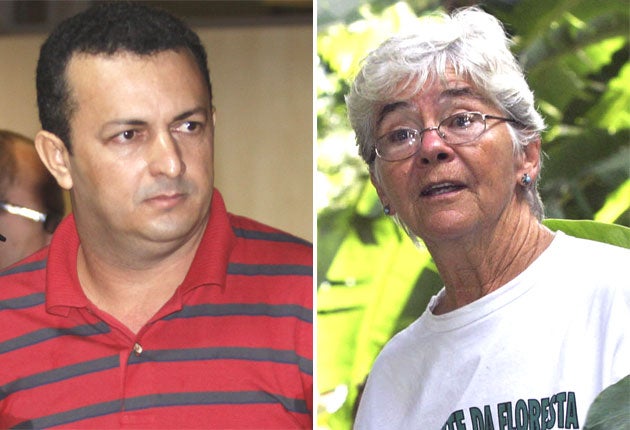Five years on, the murdered 'Angel' is avenged
Rancher behind assassination of nun who fought to save Brazilian rainforest is convicted – for a second time

Your support helps us to tell the story
As your White House correspondent, I ask the tough questions and seek the answers that matter.
Your support enables me to be in the room, pressing for transparency and accountability. Without your contributions, we wouldn't have the resources to challenge those in power.
Your donation makes it possible for us to keep doing this important work, keeping you informed every step of the way to the November election

Andrew Feinberg
White House Correspondent
Sister Dorothy Stang could barely have done more to help others. For more than 30 years, she lived deep in the Brazilian jungle fighting for the rights of small farmers and battling to protect the rainforest she had chosen to make her home.
In the dusty town of Anapu, a 30-hour drive from the regional capital, Belém, the energetic Catholic nun from Dayton, Ohio, promoted sustainable development and spoke out against the rapacious ranchers and mining companies destroying the forest. She endured mosquitoes, isolation and death threats, or at least she did until she angered one powerful person too many. Five years ago the 73-year-old, known as the "Angel of the Rainforest" to those who loved her, was assassinated.
Her body was discovered face down on a dirt track 30 miles from Anapu, deep in a jungle humming with insects. She had been shot at least six times at close range and her Bible lay at her side. It would later emerge she had read to her killers from the Beatitudes, telling them: "Blessed are the poor in spirit."
This week, a court in Belém convicted Vitalmiro Moura, a wealthy landowner, of ordering her killing because she had blocked the efforts of him and another rancher from taking over land that the Brazilian government had set aside for small farmers. Moura was sentenced to 30 years in jail. He had previously been convicted only to have the verdict overturned at a subsequent appeal on a technicality. He has already indicated his intention to appeal this result.
Speaking last night from Belém, Sister Dorothy's brother, David Stang, said: "[Moura] has already appealed this trial. However, he is in jail, he will not be freed for the appeal and he has now twice been convicted. These are real things. The other important thing is that this story continues to grow."
Rebeca Spires, a nun who has worked in Brazil for 40 years and who knew Sister Dorothy for 35 of them, told reporters: "We've waited so long for this verdict. This conviction sends a strong message to the other masterminds that the impunity is ending."
Sister Dorothy, a member of the Sisters of Notre Dame de Namur, an order that has championed liberation theology, deliberately placed herself on the front line of one of the planet's deadliest environmental battles. The Amazon rainforest, so rich in flora that an average acre contains 179 different species of plant, has never been more under threat. Despite efforts from environmentalists and promises by the Brazilian government to halt the rainforest's demise, at least 20 per cent of the jungle has been destroyed since 1970. Up to 13,000 acres a day are being lost, mainly to large-scale farmers, ranchers and mining interests.
The white-haired nun, whose struggle has since become the subject of an opera and a documentary narrated by the actor Martin Sheen, knew of the dangers. At least 1,400 people have been murdered in land disputes over the jungle since the mid-1980s, more than half of them in the lawless north-eastern state of Para in which Anapu is located. Just 10 days ago, a land reform activist in the town of Redencao, also in Para, was shot five times by two men who approached him on motorbikes.
Over the years, Sister Dorothy had received a number of threats but she believed her work was too important to stop. She wore a T-shirt printed with words in Portuguese that read: "The death of the forest is the end of our life."
Her assassination in 2005 not only highlighted the dilemma faced by the government of President Luiz Inácio "Lula" da Silva as it sought to develop the economy of Brazil – heavily dependent on agricultural exports such as soy – while protecting its environment. As with the murder of the rubber-tapper and activist Chico Mendes in 1988, her killing suggested that the environment was not winning that struggle.
This week Edson Souza, who successfully prosecuted the man who ordered Sister Dorothy's killing, drew a direct link between her murder in Anapu and a broader struggle to preserve the jungle. He said: "If we cannot convict those who kill these leaders, then we cannot maintain the fight to preserve the forest."
Subscribe to Independent Premium to bookmark this article
Want to bookmark your favourite articles and stories to read or reference later? Start your Independent Premium subscription today.
Join our commenting forum
Join thought-provoking conversations, follow other Independent readers and see their replies
Comments